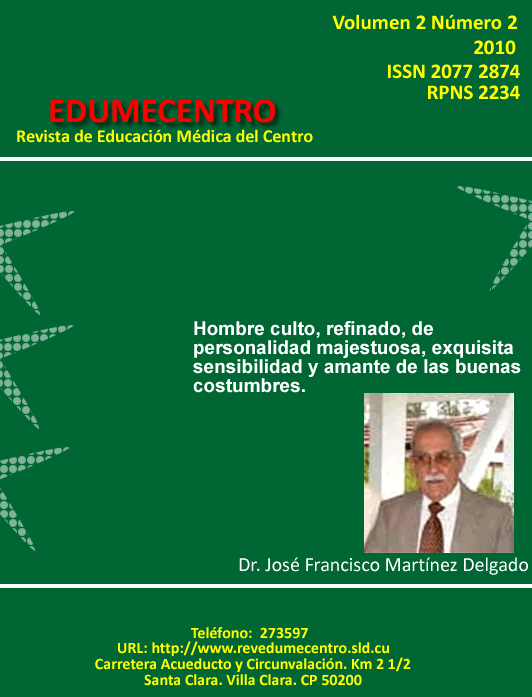Las habilidades investigativas en el currículo de Medicina. Una valoración diagnóstica necesaria
Palabras clave:
Habilidades investigativas, Educación Médica, currículo, Metodología de la Investigación.Resumen
Se realizó un estudio cualitativo en la Facultad de Medicina de la Universidad de Ciencias Médicas de Villa Clara durante el curso académico 2008-2009 para caracterizar la formación de habilidades investigativas del Médico General Básico (MGB). Las unidades de análisis consideradas fueron el plan de estudios, programas de disciplinas y asignaturas, criterios de profesores y estudiantes sobre las habilidades investigativas. Se realizó análisis documental del macro y microcurrículo, fueron encuestados directivos, profesores de experiencia, estudiantes y dirigentes de la FEU, en un muestreo por saturación. Se efectuó triangulación metodológica para obtener información desde varias perspectivas. Se precisó como dificultad la contradicción existente entre lo declarado en el macrocurrículo para esta función y cómo la concibe el microcurrículo. Las habilidades deficientes en la formación científico-investigativa fueron: la formulación incorrecta del problema científico, objetivos e hipótesis, y en menor grado las asociadas a la comunicación científica de los resultados.Descargas
Los datos de descargas todavía no están disponibles.
Publicado
2013-02-08
Cómo citar
1.
González Capdevila O, González Franco M, Cobas Vilches ME. Las habilidades investigativas en el currículo de Medicina. Una valoración diagnóstica necesaria. EDUMEC [Internet]. 8 de febrero de 2013 [citado 12 de febrero de 2026];2(2):66-78. Disponible en: https://revedumecentro.sld.cu/index.php/edumc/article/view/75
Número
Sección
ARTÍCULO ORIGINAL
Licencia
Los autores que publican en esta revista están de acuerdo con los siguientes términos:- Los autores/as conservarán sus derechos de autor y ceden a la revista el derecho de primera publicación de su obra, el cuál estará simultáneamente sujeto a una Licencia Creative Commons Reconocimiento-NoComercial-CompartirIgual 4.0 Internacional (CC BY-NC-SA 4.0) que permite a terceros compartir la obra siempre que se indique su autor y su primera publicación esta revista.
- Los autores pueden establecer por separado acuerdos adicionales para la distribución no exclusiva de la versión de la obra publicada en la revista (por ejemplo, situarlo en un repositorio institucional o publicarlo en un libro), con un reconocimiento de su publicación inicial en esta revista.
- Se permite y se anima a los autores a difundir sus trabajos electrónicamente (por ejemplo, en repositorios institucionales o en su propio sitio web) antes y durante el proceso de envío, ya que puede dar lugar a intercambios productivos, así como a una citación más temprana y mayor de los trabajos publicados (Véase The Effect of Open Access) (en inglés).









